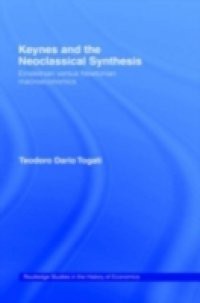This remarkable volume provides a critical assessment of Neoclassical Synthesis, long regarded as the standard interpretation of Keynes. Taking issue with this orthodoxy, the author offers a unique interpretation of the foundation of modern macroeconomics, arguing that the subject derives from the conflict between two research programmes inspired by different paradigms in physics: the Newtonian programme of Hicks and the Einsteinian approach of Keynes. Original and provocative in its reflections, Keynes and the Neoclassical Synthesis not only offers a fresh interpretation of Keynes but makes an important contribution to debates within post-Keynesian economics. It will thus be of interest to all those interested in Keynes' place in the history of economic thought and macroeconomic methodology.

